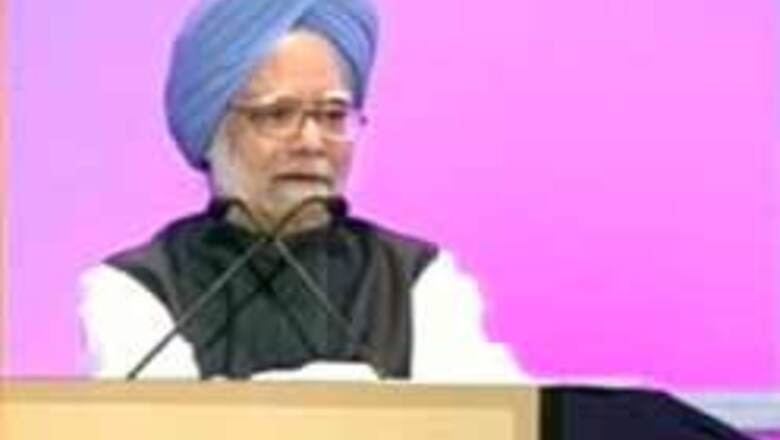
views
New Delhi: Following is the text of Prime Minister Manmohan Singh's speech titled "Can India lead the way in the next century" at the Hindustan Times Leadership Summit here Friday:
"In the past four years your annual summit has repeatedly focused public attention on the challenges of development India is facing and the opportunities before us in the new century.
Four years ago I said to you that one of the great experiments of the past century was the struggle of the Indian people to seek their social and economic salvation within the framework of a plural and liberal democracy. This will remain the great human experiment of the present 21st century as well.
I said then that the 'idea of unity in diversity' and the philosophical tradition that inspired it remain our great inheritance that we would like the entire world to embrace. The notion of cooperative pluralism and respect for diversity that is the basis of our democracy must also be the basis of global governance in the 21st century.
People seek well-being and sustainable livelihoods, but they also seek fundamental freedoms. People want jobs, people want education, people want housing and health care.
But people also want open societies and open economies. People seek freedom from tyranny in all its manifestations. They wish to be governed by the rule of law. This has been the human endeavour and will remain so.
India's success in transforming the lives of its people as a liberal and plural democracy, a free society and a free economy, will provide hope for millions around the world. We may have paid a price in terms of economic growth and efficiency, but we have gained as a free people. Let us never belittle our achievements nor our ambitions in this regard, and certainly not our struggle.
The world also has a stake in the success of the Indian experiment. The world will watch India's efforts to rid its people of chronic poverty, ignorance and disease within the framework of a democratic polity. The success of this Indian experiment will remain not just our ambition for the new century. It will be the global ambition.
Ladies and gentlemen, at your summit in 2006 I reminded you of what Winston Churchill said, at the height of the Second World War. That the "empires of the future will be the empires of the mind." In saying so, he recognized the importance of knowledge in determining the destinies of nations. The intellectual, cultural, social, economic and political empowerment of individuals is the basis on which the modern world will be constructed. This defines our second ambition for the coming century. India will not only be the land of a free people, but of a knowledge-empowered people.
My greatest ambition for the coming century is to see a fully educated India. The light of knowledge must touch every child and empower every citizen. I have this dream for my people because that was my dream as a young boy in a distant village. I stand before you today because the light of knowledge has empowered me. I cannot think of any other reason. Like millions of Indians I come from a family of modest means. I lived in a dusty village with no doctor, no school, no electricity, no drinking water.
It was the burning desire to learn, to be educated, that has brought me here to these glittering halls from that village without hope. It was scholarship and fair selection that educated me. It was a free society and a land of opportunity that employed me. My dreams for myself have been realized in my lifetime because my country made me. At your Summit in 2007 I said to you that it is up to us to build the foundations that can help us realize our potential.
Our challenges and tasks present themselves to us everyday. It is up to us to exert pressure on our system to deliver. We must improve the quality of our educational system. We must improve the public delivery system, especially in health care, sanitation, drinking water and public transport. We must build a more efficient and competitive economy. We must provide an even better environment for individual enterprise to flower and flourish. These have been the focus of our Government's policies these past four years and more.
Ladies and gentlemen, the global economy is going through choppy waters. However, we can and will survive this crisis and emerge stronger if we have the imagination and will to work together. Competitive politics must not be allowed to divide our people on the basis of religion, caste or region. At home and globally we seek an inclusive growth process.
Our century will be shaped by how we respond to the global economic crisis today. If nations look only inwards and imagine they can solve their problems on their own, they will fail. The world has become more integrated and inter-dependent. In both good and bad, in prosperity and peril, in opportunity and crisis we must recognise the new inter-dependencies. No nation is an island unto itself.
That is why at the G20 Summit last week I urged world leaders to recognise these inter-dependencies and our stake in it. We need a global safety net so that the poor of the world do not pay a price for the profligacy of the rich, and the delinquency of a few. Global problems require global solutions. This is the most important lesson of the past century for the next. But global institutions of governance must be made more inclusive and representative. The voice of the developing world must be heard in the high councils of global decision-making.
The message of the economic and social crisis gripping the world is that extremist ideologies, political or economic, have harmful consequences. The idea of India, based on the rejection of extremes, respect for diversity and pluralism and the acceptance of the Middle Path, offers new pathways to progress for humanity in distress.
When nations have tilted to extremes they have either hurt themselves or harmed the world. To regain balance they have always had to return to the Middle Path of social and economic progress. I do believe that such a pragmatic approach to policy can help us deal with the challenges the world faces today.
Ladies and gentlemen, my call for moderation is not a rejection of boundless ambition. In some areas of human conduct such ambition is a necessary part of progress. Last week the Indian tricolour landed on the Moon. I salute with pride our space scientists and engineers. A few weeks earlier the global community agreed to recognise India's status as a nuclear power. I salute with pride our nuclear scientists and engineers. I also salute with pride the political leaders and policy makers who invested in these ambitious programmes.
Both achievements, on the nuclear and space fronts, come more than half a century after we as a nation set ourselves ambitious goals in the most advanced fields of scientific endeavour. When Pandit Nehru, Homi Bhabha and Vikram Sarabhai set for themselves the goals of tapping nuclear energy and exploring space, ours was a poorer nation. A less developed nation. Many mocked them for their ambition. Our achievement today mocks the cynicism of the non-believers. Such ambition must be commended. It is the kind of ambition that spurs progress and widens human imagination.
I would like to see similar ambition in ridding our country of poverty, ignorance and disease. I would like to see similar ambition in liberating the minds of our people from the deadweight of prejudice and bigotry. I would like to see similar ambition in our effort to educate and feed every child. I would like to see similar ambition in providing safe drinking water and electricity to every home across this vast land. I would like women to be equal partners in sharing the fruits of social and economic progress. I would like to see similar ambition in our endeavour to secure a neighbourhood of peace and prosperity.
No goal is impossible, no hurdle is insurmountable. But if we set our sights low, no achievement is laudable. While celebrating our achievement in space, let us reflect on its lessons for us on Earth. The moon landing was the fulfilment of a vaulting ambition. It was the result of years of hard work. Above all, it was the fruit of cooperative enterprise. Hundreds of Indians - not divided by their religion, region, language or caste, but united by their commitment to hard work and passion for a scientific adventure made this possible.
Who looks at our nuclear scientists or space engineers in terms of their narrow social identities or their religious beliefs? Who asks them what their caste is or religion is? Who asks what their language is or region is? We only ask what their achievement is. It is their work that defines them. Why cannot we look at each of our citizens in terms of their contribution to nation building, to good neighbourliness, to promotion of communal harmony, to concern for the well-being of marginalised sections of society, to peace and progress around us? Is this an ambitious goal?
Am I asking for too much when I ask each one of you to stop identifying yourself in terms of how the past has shaped you, but do so in terms of how you can and are shaping the future? For the hundreds of women and men who put the Indian tricolour on the Moon the past was no guide to the future they made possible in our present.
Let no prejudice from the past shape, nor a hurdle in the present thwart our ambitions for the future. We should be firm in our resolve to make the future happen. That should be the message of your Summit this year.



















Comments
0 comment